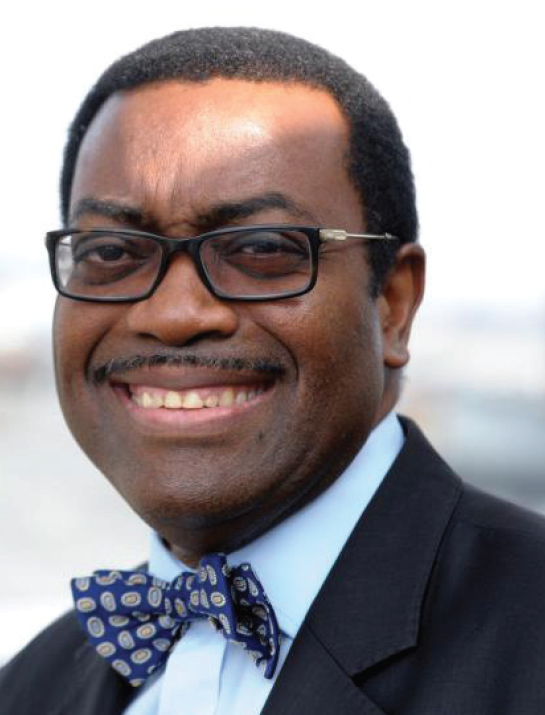On May 28, 2015, Dr. Akinwunmi Adesina emerged the new president of the African Development (AfDB) after defeating Cape Verde’s Cristina Duarte and Chad’s Kordjé Bedoumra in the final round of voting for the exalted position.
His victory was not surprising to Nigerians who are quite aware of his pedigree as an erudite reformer whose larger-than-life passion for agriculture and business ranks second to none in the country. It was also a delight for many Nigerians who were strongly behind his emergence in the light of his huge achievements under the immediate past administration of former President Goodluck Jonathan.
Under Jonathan, Adesina’s Ministry of Agriculture and Rural Development stood out because of its many reforms and consequent outstanding accomplishments which many people have aptly attributed to the sound and innovative leadership provided by the Ogun State born agriculturist Exiting office as Minister of Agriculture on May 29, 2015, having held the post since 2011, Adesina left behind an enviable legacy after successfully ending 40 years of corruption in the fertiliser sector through developing and implementing a ground-breaking electronic wallet system that directly allows farmers with subsidized farm inputs at scale using their mobile phones, thus turning around the lives of about 14.5million farmers in the process.
Adesina was also responsible for Nigeria’s improved food production, expanding it by 21 million metric tonnes, surpassing the 20 million metric tonnes target initially set out for the tenure at the onset. He also attracted about $5.6billion private sector investments to the country’s agriculture sector via changing the perception of agriculture in Nigeria from that of subsistence to a viable business undertaking.
For the first time in the country’s history, he also succeeded in making agriculture attractive to youths by providing those interested with the needed financial and logistics support to make a business out of farming.
While many people acknowledge and appreciate Adesina’s performance in office as a minister, only very few have insight into his driving philosophy and the underpinnings for his dogged determination to achieve and succeed. According to his Special Assistant on Media and Strategy, Dr. Olukayode Oyeleye, Dr. Adesina had a hero in the scriptures after which he patterned his mode of intervention. Oyeleye said the former minister, during his first private encounter with him, disclosed that “the wall of agriculture in Nigeria was broken down” and needed to be fixed. Accordingly, Adesina told him that he was in Nigeria for what he described as
“Nehemiah’s mission.”
Anyone who read about Nehemiah would have no difficulty understanding the passion Adesina deployed to his work as minister. Before the advent of Adesina, the Nigerian agricultural sector was a constant source of headache for Nigerian leaders, including former President Olusegun Obasanjo, who himself is a farmer. This is why Jonathan’s appointment of Adesina, a man he barely knew, is considered a masterstroke that has succeeded in saving Nigeria’s ailing agricultural industry.
Although the sector is still far from competing favourably with its counterparts in advanced economies, Adesina’s policies have laid very solid foundation for a brighter future for the sector which was formerly a great source of concern to Nigerians. And these are only few of what he has done for Nigeria. Indeed, it is impossible to mention all the reforms and achievements of this outstanding bold reformer, who, on a daily basis, churned out programmes that eventually turned farmlands across Nigeria into goldmines and crude farmers into dignified businessmen and women and, in fact, millionaires.
With his passion for agriculture and business, innovative leadership and clear vision of where that part of Nigeria’s economy should be in the years ahead, Adesina applied the proverbial Midas touch that was needed to turn around the agricultural sector and affect the lives of millions of Nigerians and the future generations to come. His contributions have earned him international accolades such as the Forbes Africa Person of the Year award, which he got for his bold reforms in the agriculture sector that have empowered millions farmers across Nigeria.
It was the first time a public sector Minister in Africa would win the award. On the local front, he was adjudged the 2013 Public Servant of the Year by Leadership Newspaper because of his bold policy reforms, transparency, and public accountability. Amongst other feathers in his cap is the Outstanding Black Agricultural Economist award by the American Association of Agricultural Economists; a Distinguished Africanist Scholar at Cornell University, USA; a prestigious YARA Prize in Oslo, Norway, which he got for his innovative approaches to improving access to agricultural inputs for African farmers in 2007; the Distinguished Alumni Award from Purdue University, USA in 2008, the Distinguished Alumni Award in 2009 and the Grand Commander of Great Ife in 2013, both from the Obafemi Awolowo University.


Many have argued that Adesina’s story is like that of a river that did not forget its source because his achievements cannot be divorced from his background as the son of a simple farmer from Ogun State, who watched his father work hard to see him through school, paying with the proceeds from his farm.
Moved by passion for agriculture and the desire to find a better life for people like his father in a country where oil is the mainstay of the economy and the major focus of the Federal Government, Adesina began his journey to finding a solution to Nigeria’s agriculture question by going on to get himself a first class degree in Agricultural Economics from the University of Ife in 1981.
From Ife, he moved on to the USA, where he got himself a Masters degree and Ph.D. in the same Agricultural Economics in 1985 and 1988 respectively from Purdue University. Not yet done, Adesina went on to garner more than 25 years of experience about making business out of agriculture, and in 2011, he got the opportunity to make his longtime dream a reality. He did so in grand style for the world to see.
Former SEC boss and ex-vice president of the African Development Bank (AfDB), Arunma Oteh, who is wellknown for her no-nonsense manner, rates Adesina’s achievements in Nigeria as the best the country has seen in a long time. “In my view, we haven’t seen the kind of progress in previous years that we’ve seen on agriculture [under Adesina]. And that is a whole change of mindset and some very concrete results on the ground, including reducing the import bill, building a value chain for rice, for cassava – the whole focus is not just on production but industrialisation,” she said in a recent interview.
Adesina’s results as Agriculture Minister were a rub-off of his many years of working in internationally recognised institutions like the International Crops Research Institute for the Semiarid Tropics between 1988 and 1990 as Assistant Principal Economist, the West Africa Rice Development Association, where he was Principal Economist between 1990 and 1995 and the International Institute for Tropical Agriculture as Senior Economist and Social Science Coordinator between 1995 and 1998.
He also worked at the Rockefeller Foundation, where he served as Associate Director and Regional Director for the Southern Africa Office for over a decade before joining Alliance for a Green Revolution in Africa (AGRA), where he was Vice President (policy and partnerships) before he was called on to handle the Ministry of Agriculture by Jonathan.
Given Adesina’s extensive accomplishments and knack for producing the most outstanding of results, the continent of Africa is already looking forward to a rejuvenated AfDB under him as he takes over office from Donald Kaberuka. Oteh, who understands quite well the challenges facing the bank as a former executive of the financial institution, believes that Adesina has more than what it takes to reposition the bank for the future. “[Adesina] understands finance, understands the private sector, infrastructure and agriculture. He’s got a very holistic eco-system approach to business.
The Bank needs execution and needs to scale up. He’s run the Ministry of Agriculture as an agency that has probably about 7,000 employees if you take the core ministry and agencies – so the experience in Nigeria prepares him adequately for this role,” she said. Head of the Africa team at the OECD Development Centre Henri-Bernard Solignac-Lecomte, is also delighted with Adesina’s appointment and hopes that he will continue with Kaberuka’s bid to make the AfDB a knowledge bank, while focusing on a narrative of inclusive growth.
“It’s essential to understand the very unique features of Africa’s structural transformation challenge in that relations between rural and urban are going to be very different – a very unique pattern that evades anything we’ve learned from other experiences. So, having someone who has hands-on experience of reforming such a complex sector in such an impossible country like Nigeria is, I think, a really good sign for the bank as a whole.
“He’s talked a lot about inclusive growth, and that’s one way of saying that structural transformation needs to be accelerated. There needs to be growth of a different nature. I guess that’s what he’s saying: so, on the face of it, he’s going in the right direction,” Solignac-Lecomte said. Ever ready for challenges and setting new records, Adesina has already put forward an expansive vision statement about what he wants to see done at the end of his tenure as President of the AfDB.
This include catalysing and mobilising resources globally for the Bank Group and the continent through strategic partnerships; nurturing first-rate multi- lingual staff at the Bank with the skills required to usher in a new Africa; fostering strong ethics, transparency, good governance and accountability within the Bank to enable it become known as “Africa’s Bank for integrity”; ensuring that the Bank adopts a “people-oriented approach”, able to address and meet the needs of millions of Africans – a true development Bank for Africa’; and transforming the Bank into a “go-to-institution” on development in Africa, with renewed and strong partnerships with its member countries, the Africa Union, the Economic Commission for Africa and the Regional Economic Communities.
The years ahead will tell what new achievements the 55-year-old agriculturist would add to his resume, but with the Adesina that Nigerians know and love, it is important to note that impressive outcomes should not come as surprising since that is his forte. With huge achievements, bountiful certifications and awards for affecting the world positively, Adesina has come a long way to prove something.
He has proved that a simple farm boy from a small non-descript town in Ogun State can go all the way to show that his passion can change the world. Nigerians, who lovingly sent him to AfDB, will be waiting for his return in the years ahead, maybe even to give him a greater responsibility of taking not just a sector of the economy but the whole of Nigeria to the next level, with results guaranteed.



